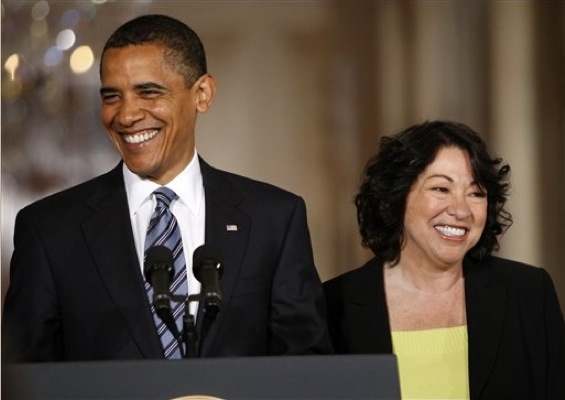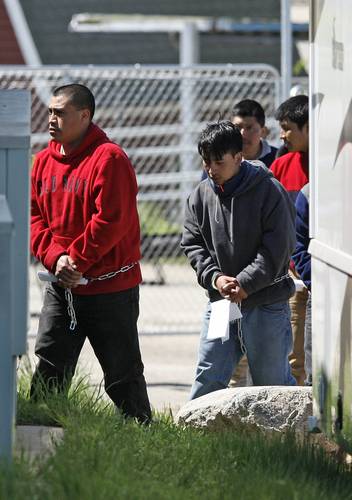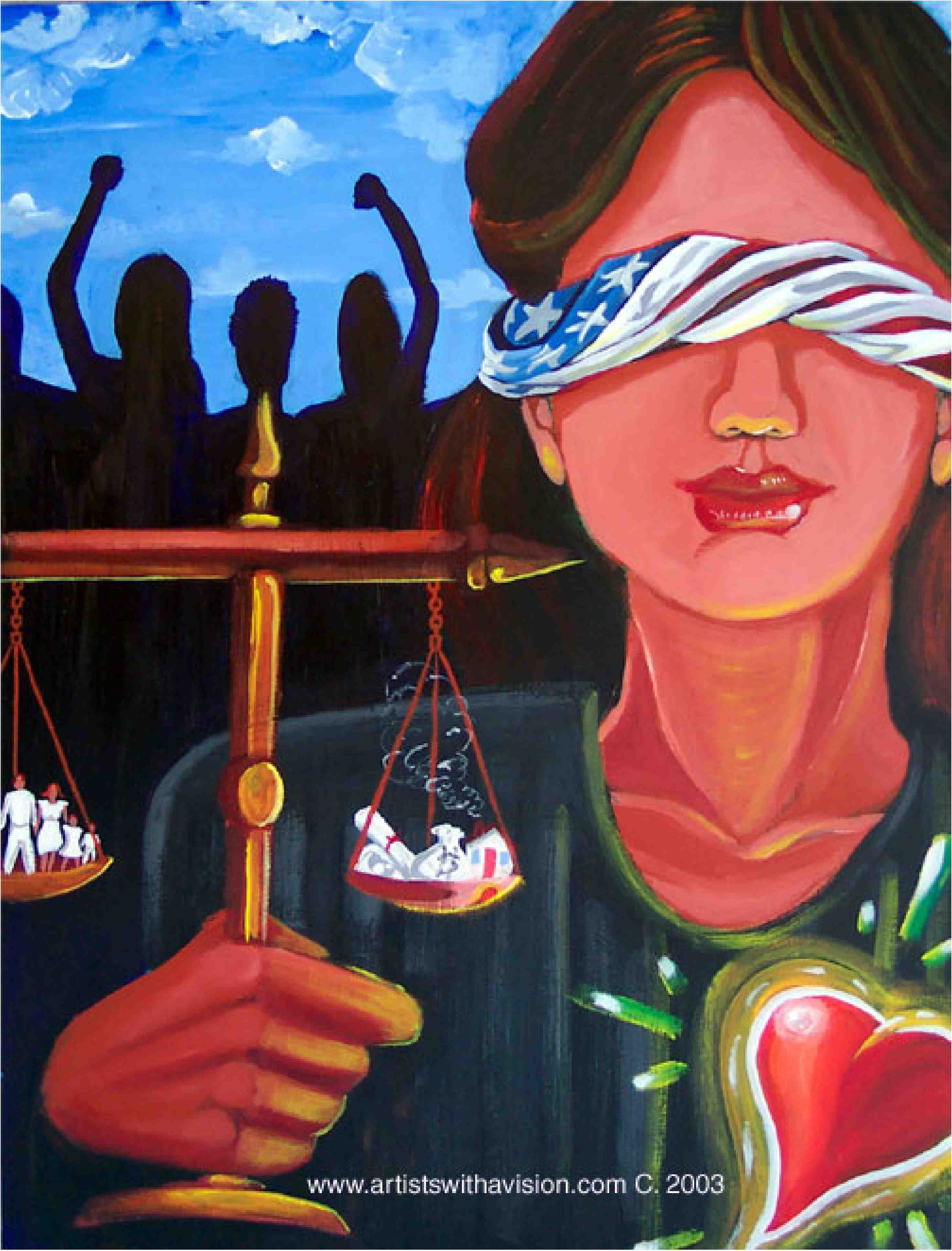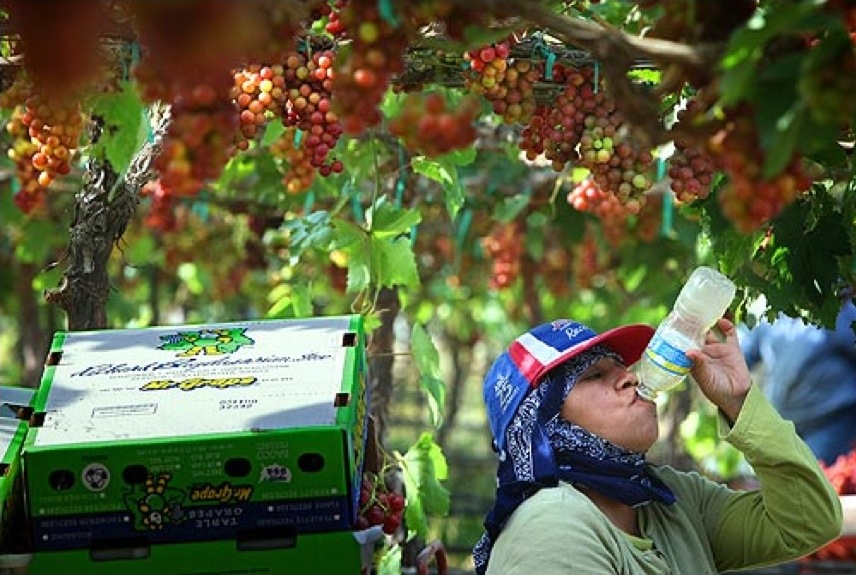|
The Latino Experiences in the United States SOC 335 Fall 2009  
  |
|
The Latino Experiences in the United States SOC 335 Fall 2009  
  |
|
CSU Employee
Furloughs
– Impact on Classes
This year across this campus and around the CSU system some class days
will
be cancelled because of furloughs. A furlough is mandatory un-paid time
off; faculty and staff on each CSU campus are being “furloughed” two
days per month.The CSU has suffered chronic underfunding for at least 10 years. This year the budget cuts are the worst in the history of our university system — $584 million or 20% of our budget. The CSU administration is attempting to deal with these cuts with huge increases in your student fees (32%), eliminations of your classes, and lay-offs of faculty and other university employees. In addition to paying higher fees, you will be affected by reduced services and classes. The library will have shorter hours. Many campus support services will be decreased or eliminated. It will be more difficult to get signatures to meet deadlines. Classes you need may have been cut from the class schedule or are full. In this course, as an alternative to cancelling classes twice a month, we will cancel the mid-term research paper and reduce the number of office hours. It is important to recognize that these reductions in the quality of your education are not holidays to celebrate. Instead, they are concrete examples of how massive state budget cuts have consequences for you as students and for us as faculty members. If you would like to take action or simply learn more, we recommend you contact the California Faculty Association and your Associated Students leaders on campus. |
TEXTBOOKS
This course explores the sociological
experiences
of the Latino peoples in the United States through four distinct.
salient and dramatic aspects: Firstly, from their experiences of
racialization. Up until recently, members of Congress, major
newspapers, and entrepreneurs in the United States openly racialized
Latinos and Latin Americans. Latinos and Latin Americans were deemed
inferior mongrels that had to be saved from their ways. Such ideology
served mainly to justify the armed invasions of sovereign neighboring
nations, dispossession of land, and economic exploitation, both within
the expanding U.S. and throughout its hemispheric reach. Using the
Cobas, Duany, and Feagin anthology, we will study how noted
Latin American, Latino, and U.S. social scientists have recently
addressed the extent and costs of racialization of Latinos under U.S.
hegemony. Immigration restrictions, instauration of U.S.-style racism,
violence, and suppression of Spanish and intergroup conflict are some
of the current developments they analyze.
Secondly, we will explore, using
the Dávila book, the contemporary contradictory
representations of Latinos in the public sphere as both a problem
(immigrant) and an opportunity (voters, consumers). Dávila
elegantly unravels the media driven sleight-of-hand that simultaneously
celebrates an all-American (and almost entirely manufactured) Latino
middle class while demonizing recent Latino immigrants and the poor
folks who resemble them. This unacknowledged-yet-pervasive media
schizophrenia is a reflection of the unresolved and much contested
"place" of Latinos in the post-civil rights social order, marked by
extensive North American integration and massive immigration of Latin
Americans.
Thirdly, we interrogate and challenge,
using the Chavez book, the "Latino Threat Narrative"—the idea that
Latinos are incapable of integration and are ominously taking over,
undermining our institutions, and changing
America for the worse. We will thoughtfully analyze the conflicted
meanings of citizenship in an increasingly globalized world.
The last topic, using the Bacon book,
will be studying the structural and ideological origins
of the ongoing
resurgence of racism and xenophobia against Mexican
undocumented immigrants specifically, which has become the central
racialization phenomenon in the
United States in this first decade of the 21st. Century, and which, as
a
result,
has sparked a mighty, impressive social movement in the United States,
the immigrant
rights movement responsible for mobilizing untold millions to protest
and march
in 2006.
The course will be run in a seminar
format. Students will form thirteen groups ("grupos") of up to four students
each, and, after the first week of class, will take turns introducing
and analyzing the assigned readings for each session, followed by class
discussion, with Dr. Santos participating. That way each student will
make two class presentations during the quarter. Every student group
will present twice to the class.
Attendance is mandatory (please, no tardiness or early departures, as
these will be penalized). ALL students must come prepared to discuss
the readings - either through their formal presentations, or, when they
are not presenting, by bringing to class their reading assessments.
The reading assessments must be turned in to Dr. Santos at the
beginning of each class session. (No late submissions will be accepted)
The students will also collaborate within their groups to produce a
research project on topics related to the Latino experiences in the
United States -- each student will therefore also write a research term
paper.
Class
Presentations: At the
beginning of the course, the students will be organized in groups of up
to four. On those dates identified in the schedule below, groups
will make PowerPoint presentations on their assigned readings -- groups
can expect to present twice in the quarter. Class discussion will
follow the presentations.
Please email Dr. Santos an electronic
copy of your presentation. Time allotted per individual presentation
will be 5 to 8 minutes. Each presenting student will introduce,
describe, highlight, and summarize his/her own portion of the assigned
readings, and on the last slide raise one relevant, interesting
question for subsequent
discussion. As a precaution, please bring your presentations in a
USB-type memory stick and also email it to your own Runner email
account. DO NOT BRING YOUR POWERPOINT PRESENTATION IN FORMAT ".pptx" or
"ppsx", as the class computer WILL NOT READ IT (only use "ppt" or "pps"
formats). When it's your turn to present, please show up early to
set it
up & test it. It is each group's responsibility to coordinate their
presentations so that there will be minimum
overlap between them.
Each presentations will be graded based on: (a) the analytical strength
of the presentation (how well it
organized and covered the selected aspects), (b) critical thinking,
added materials, and originality,
(c) the quality of the question posed
at the end, (d) the quality of the visuals used, and (e) the quality
& style of the oral delivery.
Reading Assessments: To ensure that everybody come to every
class prepared to discuss the assigned readings, students who are not
presenting must bring to class one written "reading assessment" per
chapter assigned, each up to two pages in length, double-spaced text. Dr. Santos will randomly select a couple
of students to read their assessments and/or questions in the
discussion periods. No late reading assessments will be
accepted, unless the student has a pre-authorized absence from Dr.
Santos. DO NOT SEND YOUR READING ASSESSMENTS BY EMAIL.
CONTENT: Please always write on top of your
reading assessments your name, the date, and the reading you are
assessing. In contrast to the presentations, these
"reading assessments" must not
summarize or merely describe the readings, but must critically respond to them: express what the you think about them; identify the
areas of strong agreement and
disagreement with the author, explaining why you do, as well as
the areas or topics you find most
interesting to discuss, or anything in particular that impressed you greatly, caused you confusion, or surprise. Whatever you write, you
should explain your specific
academic and/or personal reasons for doing
so. The reading assessment cannot and should not cover every issue found in the assigned
readings for the day; you must be selective
and demonstrate judgment
in the choices of topics you make to analyze (by the way, early topics
are always
suspect!). A very bad assessment will reveal the student read very
little or very superficially just to do the assignment (it's called
"going through the motion"). A good assessment will demonstrate the
student really read the material and did a serious effort to select and
critically grapple with some of the main issues raised. At the end of
each reading assessment, students should always write their own
question for class discussion.
Note: Students
presenting on a given day do not
need to submit any reading assessment.
Research Papers: Students
in each grupo will also be asked to chose a
pertinent historical/sociological topic relating to the Latino
experiences in the United States, and design, organize, and carry out a
written group
research project on it. The selected subject may be panethnic
(all
Latinos) or ethnic (one Latino ethnic group); it might focus on
the immigrant and/or
the U.S. settlement
experiences; the period
covered may be historic (19th., 20th. centuries), or contemporary
(1990s to now); the spatial dimension may be as small as a city
or local area, a state,
a region of the U.S.,
or as large as the entire North America &
Caribbean area; the topics may focus on the social, political,
economic, demographic, and/or cultural
conditions,
trends, institutional dynamics, or social movements, or burning issues
affecting Latinos
or affected by them (health, education, political participation, etc.).
There are literally hundreds
of
interesting topics - so brainstorm! The students must obtain approval
from
Dr. Santos
for both their overall grupo topic and for each of their
individual
subtopics no
later than October 30.
Grupo
delegates may visit Dr. Santos at his office during his office hours
posted above.
Extra Points: Perfect attendance will be rewarded with up to five extra points. Another way to get extra credit is to attend those campus or public events Dr. Santos announces in class and write a two-page report on each of them. Another way is this: there are two general studies courses that students are strongly encouraged to take if they wish to develop their research skills, and if they do (either or both) will receive extra credit in this course: These courses will enable students to develop the necessary competencies to navigate their way around the complexities of researching print and electronic sources. For further information contact librarian Christy Gavin (email: <cgavin@csub.edu>, phone: 661-664-3237).
Plagiarism: To prevent students from wittingly or
unwittingly engaging in plagiarism, Dr. Santos strongly recommends
students to carefully read and abide by the document CSUB
Classifications of Plagiarism found at: http://www.csub.edu/tlc/options/resources/turn_it_in_help_page.shtml
Anyone found guilty of engaging in
plagiarism will
automatically fail the course and be reported to the Office of Student
Discipline and Judicial Affairs for further disciplinary action.
Grading:
Each grupo class presentation is worth 10 points each.
The research project is worth 40 points (35 points for the
individual
paper, and 5 points for the quality of the conceptual and physical
organization of the grupo volume as a
whole). The reading assessments are worth the remaining 40 points. The
extra credit students may
receive for
taking the suggested General Studies courses will depend on their final
grade in those courses, and may range from zero to 6 points (up to 3
extra points
per course). Perfect attendance will also be rewarded with 5 extra
points; absences and tardiness/leaving early will be penalized with one
point off per instance. The final
letter grade will be assigned, on a scale of 0 to 100, as follows:
| 94-100 = A | 87-89 = B+ | 77-79 = C+ | 65-69 = D |
| 90-93 = A- | 84-86 = B | 74-76 = C | < 65 = F |
| 80-83 = B- | 70-73 = C- |
Office Hours & E-Mail to Dr. Santos:
All students are encouraged to visit Dr. Santos regularly during his posted office hours, to go over their presentations, to ensure their grupo research project topics and subtopics, their individual research papers are well focused, or to discuss any question from the class lectures, the textbooks, or their grupo class presentations. Consultation and approval of the grupo research topics must be done in person at Dr. Santos office by representatives of each grupo - no mails on that topic, please.
Dr. Santos much prefers students come to his office during office hours, or to call him by phone, rather than to receive e-mail messages that require more than a very short one-line reply - he appreciates the ease and fun of talking face-to-face, as opposed to typing! But if you wish to send Dr. Santos a brief, to-the-point message, you may do so at his email address above.
Schedule of
Reading Assignments & Grupo Presentations
| Monday |
Wednesday |
Friday |
| Sept. 14 INTRODUCTION TO CLASS |
Sept. 16 How the U.S. Racializes Latinos Introduction |
Sept. 18 How the U.S. Racializes Latinos Article 1 |
| Sept.
21 Grupo 1 How the U.S. Racializes Latinos Article 2 |
Sept.
23 Grupo 2 How the U.S. Racializes Latinos Articles 3 & 4 |
Sept.
25 Grupo 3 How the U.S. Racializes Latinos Article 5 |
| Sept.
28 Grupo 4 How the U.S. Racializes Latinos Articles 6 & 7 |
Sept.
30 Grupo 5 How the U.S. Racializes Latinos Articles 8 & 9 |
Oct.
2 Grupo 6 How the U.S. Racializes Latinos Article 10 |
| Oct. 5
Grupo 7 How the U.S. Racializes Latinos Article 11 |
Oct. 7
Grupo
8 How the U.S. Racializes Latinos Article 12 |
Oct. 6
Grupo 9 How the U.S. Racializes Latinos Article 13 |
| Oct.
12 Grupo 10 How the U.S. Racializes Latinos Articles 14 |
Oct.
14 Grupo 11 Latino Spin Introduction, 1 |
Oct.
16 Grupo 12 Latino Spin 2, 3 |
| Oct.
19 Grupo 13 Latino Spin 4, 5 |
Oct.
21 Grupo 1 Latino Spin 6, Conclusion |
Oct. 23
Grupo 2 Latino Threat Introduction, 1 |
| Oct. 26
Grupo
3 Latino Threat 2, 3 |
Oct.
28 Grupo 4 Latino Threat 4, 5 |
Oct.
30 Grupo 5 Latino Threat 6, 7, Epilogue |
| Nov.
2 Grupo 6 Illegal People Chapter 1 |
Nov. 4
Grupo 7 Illegal People Chapter 2 |
Nov. 6
Grupo 8 Illegal People Chapter 3 |
| Nov. 9
Grupo 9 Illegal People Chapter 4 |
Nov.
11 HOLIDAY |
Nov.
13 Grupo 10 Illegal People Chapter 5 |
| Nov.
16 Grupo 11 Illegal People Chapter 6 |
Nov.
18 Grupo 12 Illegal People Chapter 7 |
Nov.
20 Grupo 13 Illegal People Chapter 8 |
| The grupo
research projects are
due
by noon, Monday, November
23 at Dr.
Santos' office |
||
My GRUPO
# is: _____
We
present on these dates:
___________ and ___________
My Own Research Subtopic:___________________________________________________________
My GRUPO members are:
___Name______________________Phone_____________________Email_________________________________
1._____________________________________________________________________________________________
2._____________________________________________________________________________________________
3._____________________________________________________________________________________________
4._____________________________________________________________________________________________